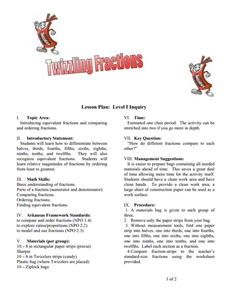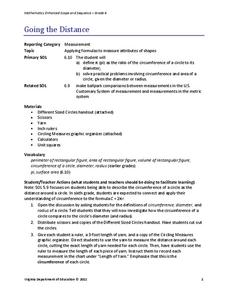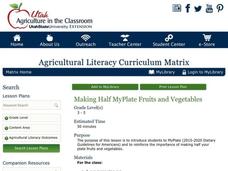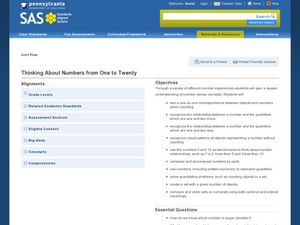Curated OER
Fractions: Jim and John
Elementary and secondary learners investigate various concepts related to the study of fractions. They use word problems during the introduction to parts of a fraction and proceed to some of the basic operations of using fractions. The...
Curated OER
IB Chemistry 1-2 Fourth Quarter Practice Test
In this chemistry practice test worksheet, high schoolers review their knowledge of oxidation numbers, chemical reactions, and solubility as they answer 15 multiple choice questions.
University of Arkansas
Twizzling Fractions
Using food as a manipulative is one of the best ways to incorporate hands-on learning in the classroom. This hands-on approach allows young mathematicians to compare, order, and identify fractions with the use of Twizzlers® and fraction...
Virginia Department of Education
Numbers in a Name
What's in a name? Pupils create a data set from the number of letters in the names of classmates. Each group then takes the data and creates a visual representation, such as a histogram, circle graph, stem-and-leaf plot, etc.
Curated OER
Exploring Equivalent Fractions
An extensive lesson explores equivalent fractions and is intended for three 60-minute periods. Young mathematicians compare and order fractions with like and unlike denominators. Included are worksheets, assessments, and answer sheets;...
Curated OER
Smiling at Two Digit Multiplication!
How do I solve a two-digit multiplication problem? Your class tackles this question by walking through problem solving methods. They first investigates and applies traditional multiplication methods, and they then compare those with...
Virginia Department of Education
Analyzing and Interpreting Statistics
Use measures of variance to compare and analyze data sets. Pupils match histograms of data sets to their respective statistical measures. They then use calculated statistics to further analyze groups of data and use the results to make...
Science Matters
Richter Scale
The 12th lesson in a series of 20 opens with a demonstration of exponential functions using pasta. This concept is connected to the Richter Scale, which is also an exponential function. Scholars compare the exponential scale that...
EngageNY
Existence and Uniqueness of Square Roots and Cube Roots
Teach cube roots by building on an understanding of square roots. The third installment of a 25-part series asks learners to solve simple quadratic and cubic equations using roots. Scholars compare square roots and cube roots throughout...
EngageNY
Displaying a Data Distribution
Pupils analyze a display of data and review dot plots to make general observations about the highest, lowest, common, and the center of the data. To finish, learners match dot plots to scenarios.
Novelinks
The Tempest: Anticipation Guide
Begin your unit on William Shakespeare's The Tempest with a helpful anticipation guide. Learners read ten statements that connect to the play's literary themes, and note whether they believe the statement is true or false.
University of Colorado
Spacecraft Speed
Space shuttles traveled around Earth at a speed of 17,500 miles per hour, way faster than trains, planes, or automobiles travel! In the 13th installment of 22, groups graph different speeds to show how quickly spacecraft move through...
EngageNY
The Pythagorean Theorem
Class members explore the estimation of irrational numbers in association with the Pythagorean Theorem. The first instructional activity of this module challenges pupils to use the Pythagorean Theorem to find unknown side lengths. When...
Science Matters
Earthquake Building/Shaking Contest
Japan is one of only a handful of countries that constructs buildings that are almost earthquake proof. The 13th lesson in the 20-part series challenges scholars to build structures to test against earthquakes. With limited materials and...
Historical Thinking Matters
Social Security: 1 Day Lesson
Should the United States provide relief for those who are unemployed? Trace this question back to the Great Depression with your young historians, who will engage in careful reading of historical documents and classroom discussion to...
Virginia Department of Education
Going the Distance
Estimate the value of one of the most famous irrational numbers. The hands-on lesson plan instructs classmates to measure the circumference and diameters of circles using yarn. The ratio of these quantities defines pi.
Science Matters
Plot Study
Small groups investigate plots of land to discover how abiotic and biotic factors interact. After recording their findings, scholars share observations with peers and self-reflect on the learning process.
Agriculture in the Classroom
Making Half MyPlate Fruits and Vegetables
Establish healthy eating habits with a lesson focused around MyPlate's food recommendations and the importance of eating fruits and vegetables. Through class discussion and worksheet completion, scholars discuss the best choices of foods...
Pennsylvania Department of Education
Thinking About Numbers from 1 to 20
Help your kindergarteners discover new number-sense concepts and to compose and decompose numbers. Though the resource contains no procedural details, the assessment tool (which you can find in the "printer friendly version") has lots of...
Curated OER
How Do You Get to School?
Third graders talk about all the various ways they get to school. They make a list of all the bus numbers that the students use. They also list all the other methods of transportation used and solidify a hypothesis.
NTTI
If You Hopped Like a Frog
Get your frogs hopping by introducing them to the concepts of ratio and proportion. As a class, they perform arithmetic operations using ratios then discover how they represent quantitative relationships. In groups, they write their own...
Curated OER
Nutrients by the Numbers
Students read and discuss an article on the amount of sugar in various food products. They compare the nutritional values of food products, calculate their daily intake of nutrients, analyze serving sizes, and compare/contrast their own...
Curated OER
Number Chart and Number Line
First graders research strategies for identifying numbers through 100. In this number recognition lesson plan, 1st graders make games, create puzzles,and fill in missing numbers to practice number identification.
Curated OER
Mystery Number
Learners explore numbers 1-100. In this cross curriculum literacy and numeration lesson, students listen to the book More or Less by Stuart J. Murphy. Learners play a game with a partner in which they guess the "mystery number" based on...

























